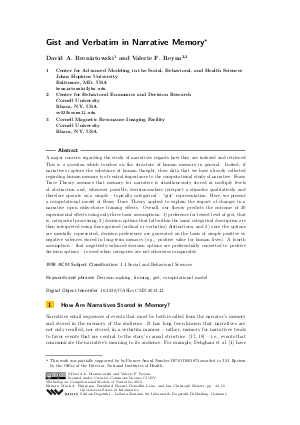Gist and Verbatim in Narrative Memory
Authors David A. Broniatowski, Valerie F. Reyna
-
Part of:
Volume:
2013 Workshop on Computational Models of Narrative (CMN 2013)
Part of: Series: Open Access Series in Informatics (OASIcs) - License:
 Creative Commons Attribution 3.0 Unported license
Creative Commons Attribution 3.0 Unported license
- Publication Date: 2013-08-02
File

PDF
OASIcs.CMN.2013.43.pdf
- Filesize: 402 kB
- 9 pages
Document Identifiers
Subject Classification
Keywords
- Decision-making; framing; gist; computational model
Metrics
- Access Statistics
-
Total Accesses (updated on a weekly basis)
0Document
0Metadata
Abstract
A major concern regarding the study of narratives regards how they are indexed and retrieved. This is a question which touches on the structure of human memory in general. Indeed, if narratives capture the substance of human thought, then data that we have already collected regarding human memory is of central importance to the computational study of narrative. Fuzzy Trace Theory assumes that memory for narrative is simultaneously stored at multiple levels of abstraction and, whenever possible, decision-makers interpret a stimulus qualitatively and therefore operate on a simple - typically categorical - "gist" representation. Here, we present a computational model of Fuzzy Trace Theory applied to explain the impact of changes in a narrative upon risky-choice framing effects. Overall, our theory predicts the outcome of 20 experimental effects using only three basic assumptions: 1) preference for lowest level of gist, that is, categorical processing; 2) decision options that fall within the same categorical description are then interpreted using finer-grained (ordinal or verbatim) distinctions; and 3) once the options are mentally represented, decision preferences are generated on the basis of simple positive vs. negative valences stored in long-term memory (e.g., positive value for human lives). A fourth assumption - that negatively-valenced decision options are preferentially converted to positive decision options - is used when categories are not otherwise comparable.
Cite As Get BibTex
David A. Broniatowski and Valerie F. Reyna. Gist and Verbatim in Narrative Memory. In 2013 Workshop on Computational Models of Narrative. Open Access Series in Informatics (OASIcs), Volume 32, pp. 43-51, Schloss Dagstuhl – Leibniz-Zentrum für Informatik (2013)
https://doi.org/10.4230/OASIcs.CMN.2013.43
BibTex
@InProceedings{broniatowski_et_al:OASIcs.CMN.2013.43,
author = {Broniatowski, David A. and Reyna, Valerie F.},
title = {{Gist and Verbatim in Narrative Memory}},
booktitle = {2013 Workshop on Computational Models of Narrative},
pages = {43--51},
series = {Open Access Series in Informatics (OASIcs)},
ISBN = {978-3-939897-57-6},
ISSN = {2190-6807},
year = {2013},
volume = {32},
editor = {Finlayson, Mark A. and Fisseni, Bernhard and L\"{o}we, Benedikt and Meister, Jan Christoph},
publisher = {Schloss Dagstuhl -- Leibniz-Zentrum f{\"u}r Informatik},
address = {Dagstuhl, Germany},
URL = {https://drops.dagstuhl.de/entities/document/10.4230/OASIcs.CMN.2013.43},
URN = {urn:nbn:de:0030-drops-41516},
doi = {10.4230/OASIcs.CMN.2013.43},
annote = {Keywords: Decision-making; framing; gist; computational model}
}
